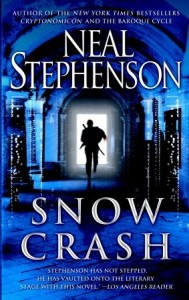 Title: Snow Crash (Goodreads)
Title: Snow Crash (Goodreads)
Author: Neal Stephenson
Published: Bantam Press, 1992
Pages: 440
Genres: Speculative Fiction, Thriller
My Copy: Personal Copy
Buy: Amazon, Book Depository (or visit your local Indie bookstore)
In a time in the not so distance future where the federal government of the United States has yielded most of its power to private organizations and entrepreneurs, franchising individual sovereignty reigns supreme. Merchant armies complete national defence, highway companies compete for drivers and the mafia own the pizza delivery game. Hiro Protagonist, “Last of the freelance hackers and greatest swordfighter in the world”, finds himself without his pizza delivery job when a young skateboard “Kourier” named Y.T. tries to hitch a ride on his vehicle. Leading them on a grand scale adventure trying to uncover just what exactly Snow Crash is.
Like all of Neal Stephenson books, you can expect this one to cover subjects like history, linguistics, anthropology, archaeology, religion, computer science, politics, cryptography, and philosophy, all while keeping to his cyberpunk thriller style. He says this book was named after the early mac software failure mode:
“When the computer crashed and wrote gibberish into the bitmap, the result was something that looked vaguely like static on a broken television set—a ‘snow crash’”
His goal, was to take the reader on a “full tour of Sumerian culture, a fully instantiated anarcho-capitalist society, and a virtual meta-society patronized by financial, social, and intellectual elites.” Snow Crash is a pseudo-narcotic or is it something far worse; Hiro and Y.T (short for Yours Truly) slowly discover that it is in fact a computer virus capable of infecting the brains of careless hackers in the Metaverse (the successor to the internet) and a mind altering virus in reality.
One of the things I liked most about Snow Crash was the fact that Neal Stephenson showed us how to write a kick ass teenage girl protagonist. Young Adult novels like to use a strong teenaged girl as a main character but few of them really know how to make her great; most are just Katniss clones. While Y.T’s narrative wasn’t as focused as that of Hiro, it was more of a pleasure to read, she seemed to accomplish the most in the entire book and she did it her own way without compromising her character. Sure, she did manage to get into some trouble and make some bad choices but she’s human, I expect them to struggle and fall and recover from their mistakes.
While this was a fun and exciting novel there are some things that I just didn’t like; firstly each ethical group portrayed the stereotypical extreme. The mafia, the rednecks from New South Africa, the Pentecostals, Mr. Lee’s Greater Hong Kong and so on, all felt very much like the cliché versions of these cultures and Stephenson played on the stereotypes a little too heavily. I know they were only minor plot arcs but it still felt like it was overdone. The most interesting people in the book are the ones living outside their cultural and ethnic groups; Hiro, Y.T and Raven.
Then there is my biggest problem with the book, which is a similar problem I had with Reamde and that is I feel like Neal Stephenson turns some chapters into a Wikipedia articles just to give us all the interesting information he has on a subject he is exploring. In this book it is every time the librarian talks, there is heaps and heaps of interesting, and sometimes irrelevant, information and the way Stephenson tried to stops it become and wall of text is the awkward attempt to make it sound like a conversation. Hiro keeps interrupting the librarian’s information with very simplified reiteration, agreements and metaphors, I found it incredible annoying.
Overall this was a fast paced cyber thriller with some weird and unusual tangents and twists. Stephenson has some interesting ideas about the future of the world but for some reason I never feel a strong connection to his books. I think I prefer William Gibson’s style and take on the future cyber world but can’t fault Stephenson for what he does. Not that I’ve read many books from this author and there are plenty more I want to read, maybe I just feel like he over simplifies and draws his novels out a little too much.

